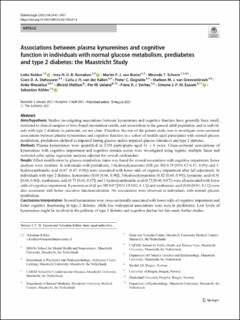| dc.description.abstract | Aims/hypothesis
Studies investigating associations between kynurenines and cognitive function have generally been small, restricted to clinical samples or have found inconsistent results, and associations in the general adult population, and in individuals with type 2 diabetes in particular, are not clear. Therefore, the aim of the present study was to investigate cross-sectional associations between plasma kynurenines and cognitive function in a cohort of middle-aged participants with normal glucose metabolism, prediabetes (defined as impaired fasting glucose and/or impaired glucose tolerance) and type 2 diabetes.
Methods
Plasma kynurenines were quantified in 2358 participants aged 61 ± 8 years. Cross-sectional associations of kynurenines with cognitive impairment and cognitive domain scores were investigated using logistic, multiple linear and restricted cubic spline regression analyses adjusted for several confounders.
Results
Effect modification by glucose metabolism status was found for several associations with cognitive impairment, hence analyses were stratified. In individuals with prediabetes, 3-hydroxykynurenine (OR per SD 0.59 [95% CI 0.37, 0.94]) and 3-hydroxyanthranilic acid (0.67 [0.47, 0.96]) were associated with lower odds of cognitive impairment after full adjustment. In individuals with type 2 diabetes, kynurenine (0.80 [0.66, 0.98]), 3-hydroxykynurenine (0.82 [0.68, 0.99]), kynurenic acid (0.81 [0.68, 0.96]), xanthurenic acid (0.73 [0.61, 0.87]) and 3-hydroxyanthranilic acid (0.73 [0.60, 0.87]) were all associated with lower odds of cognitive impairment. Kynurenic acid (β per SD 0.07 [95% CI 0.02, 0.13]) and xanthurenic acid (0.06 [0.01, 0.11]) were also associated with better executive function/attention. No associations were observed in individuals with normal glucose metabolism.
Conclusions/interpretation
Several kynurenines were cross-sectionally associated with lower odds of cognitive impairment and better cognitive functioning in type 2 diabetes, while less widespread associations were seen in prediabetes. Low levels of kynurenines might be involved in the pathway of type 2 diabetes and cognitive decline but this needs further studies. | en_US |

